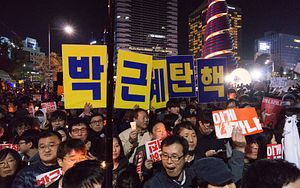South Korea’s legislature voted Friday to impeach President Park Geun-hye for her role in a bizarre political scandal centered around a Rasputin-like confidante. The vote followed weeks of public outrage that drove millions of protestors to the streets.
The National Assembly voted 234-56 to remove Park from office, with nine lawmakers abstaining or making spoiled votes, easily reaching the necessary two-thirds majority. While lawmakers voted anonymously, the emphatic result indicated a large defection of lawmakers from Park’s own center-right Saenuri Party to the liberal opposition-initiated cause. Just 28 Saenuri lawmakers had been needed to reach the threshold of 200 votes.
The impeachment vote, the second since South Korea became a democracy in 1987, immediately stripped Park of her presidential powers, pending the Constitutional Court’s confirmation of her removal from office. Six out of nine judges will have to rule the impeachment justified, following what could be months of deliberations. Former President Roh Moo-hyun, a human rights lawyer-turned-liberal political icon, regained the presidency after the court knocked back an impeachment vote by the legislature in 2004. But while South Koreans largely opposed Roh’s impeachment at the time, opinion polls show overwhelming public support for Park’s ouster. Park has indicated she will await the court’s ruling, rather than step down voluntarily. If her impeachment is upheld, an election must be held within 60 days, with likely candidates including outgoing UN Secretary General Ban Ki-moon.
Since early November, South Koreans have rallied in crowds topping one million people to demand Park resign over revelations that a close confidante exerted enormous hidden influence over state affairs, despite having no official role in government. Choi Soon-sil, the daughter of a controversial religious leader who mentored Park after her parents were assassinated in the 1970s, was able to access and edit Park’s speeches, choose her wardrobe, and direct policy. During questioning at the National Assembly on Wednesday, Cha Eun-taek, a friend of Choi’s, described the confidante as “almost at the same level as the president,” reported The Chosun Ilbo.
Choi, who has been charged with a raft of offenses, is also alleged to have used her close relationship with the president to coerce some of the country’s biggest business groups into forking over cash to charitable foundations that she used as a personal ATM.
After prosecutors named Park as a conspirator in the extortion, the daughter of a former dictator saw her approval ratings plummet to a record-breaking low of 4 percent. Park, whose term was due to expire in February 2018, remains immune from prosecution while in office, but could potentially face charges once she reenters civilian life — a fate that has befallen several past presidents.
There were jubilant scenes outside the National Assembly in Seoul as news of the impeachment vote reached protesters, who cheered and sang in celebration.
But Se-woong Koo, whose media outlet Korea Expose has been highly critical of the president throughout her tenure, cautioned that Park’s downfall should not be simplified as a simple victory for democracy or people power.
“My feeling is that this doesn’t mean much,” Koo told The Diplomat. “Park governed in such a way that it wasn’t just the people on the ground but also a segment of the conservative establishment that had come to hate her.”
It remained to be seen whether broader change would result from the scandal, Koo said.
“Park is exiting but she is just a small part of the corrupt elite,” he said. “If there is to be meaningful change, we will have to see how others ensnared by the scandal are treated, especially the big corporations.”































